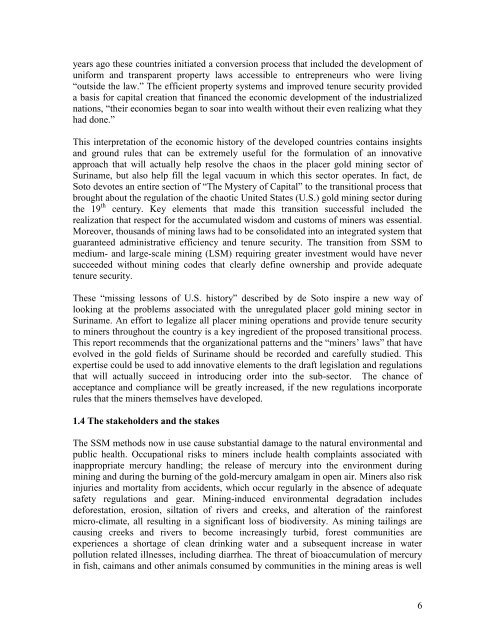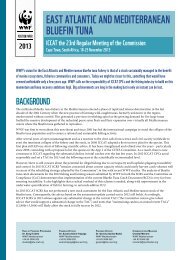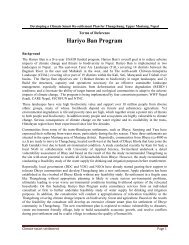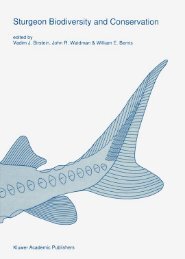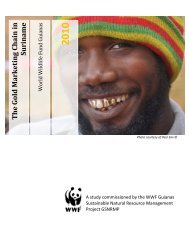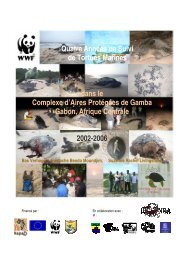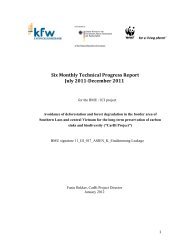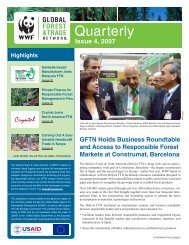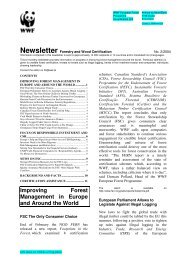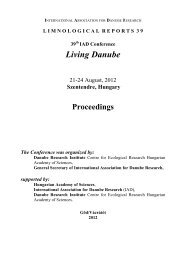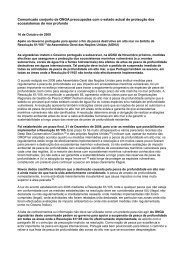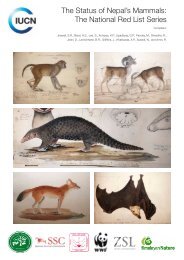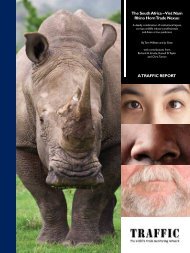SITUATION ANALYSIS OF THE SMALL-SCALE GOLD ... - WWF
SITUATION ANALYSIS OF THE SMALL-SCALE GOLD ... - WWF
SITUATION ANALYSIS OF THE SMALL-SCALE GOLD ... - WWF
Create successful ePaper yourself
Turn your PDF publications into a flip-book with our unique Google optimized e-Paper software.
years ago these countries initiated a conversion process that included the development of<br />
uniform and transparent property laws accessible to entrepreneurs who were living<br />
“outside the law.” The efficient property systems and improved tenure security provided<br />
a basis for capital creation that financed the economic development of the industrialized<br />
nations, “their economies began to soar into wealth without their even realizing what they<br />
had done.”<br />
This interpretation of the economic history of the developed countries contains insights<br />
and ground rules that can be extremely useful for the formulation of an innovative<br />
approach that will actually help resolve the chaos in the placer gold mining sector of<br />
Suriname, but also help fill the legal vacuum in which this sector operates. In fact, de<br />
Soto devotes an entire section of “The Mystery of Capital” to the transitional process that<br />
brought about the regulation of the chaotic United States (U.S.) gold mining sector during<br />
the 19 th century. Key elements that made this transition successful included the<br />
realization that respect for the accumulated wisdom and customs of miners was essential.<br />
Moreover, thousands of mining laws had to be consolidated into an integrated system that<br />
guaranteed administrative efficiency and tenure security. The transition from SSM to<br />
medium- and large-scale mining (LSM) requiring greater investment would have never<br />
succeeded without mining codes that clearly define ownership and provide adequate<br />
tenure security.<br />
These “missing lessons of U.S. history” described by de Soto inspire a new way of<br />
looking at the problems associated with the unregulated placer gold mining sector in<br />
Suriname. An effort to legalize all placer mining operations and provide tenure security<br />
to miners throughout the country is a key ingredient of the proposed transitional process.<br />
This report recommends that the organizational patterns and the “miners‟ laws” that have<br />
evolved in the gold fields of Suriname should be recorded and carefully studied. This<br />
expertise could be used to add innovative elements to the draft legislation and regulations<br />
that will actually succeed in introducing order into the sub-sector. The chance of<br />
acceptance and compliance will be greatly increased, if the new regulations incorporate<br />
rules that the miners themselves have developed.<br />
1.4 The stakeholders and the stakes<br />
The SSM methods now in use cause substantial damage to the natural environmental and<br />
public health. Occupational risks to miners include health complaints associated with<br />
inappropriate mercury handling; the release of mercury into the environment during<br />
mining and during the burning of the gold-mercury amalgam in open air. Miners also risk<br />
injuries and mortality from accidents, which occur regularly in the absence of adequate<br />
safety regulations and gear. Mining-induced environmental degradation includes<br />
deforestation, erosion, siltation of rivers and creeks, and alteration of the rainforest<br />
micro-climate, all resulting in a significant loss of biodiversity. As mining tailings are<br />
causing creeks and rivers to become increasingly turbid, forest communities are<br />
experiences a shortage of clean drinking water and a subsequent increase in water<br />
pollution related illnesses, including diarrhea. The threat of bioaccumulation of mercury<br />
in fish, caimans and other animals consumed by communities in the mining areas is well<br />
6


